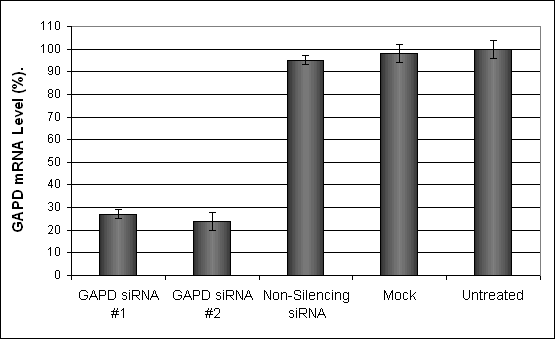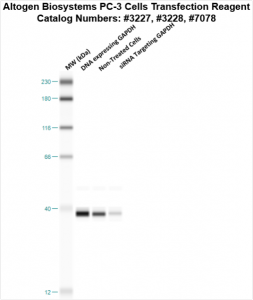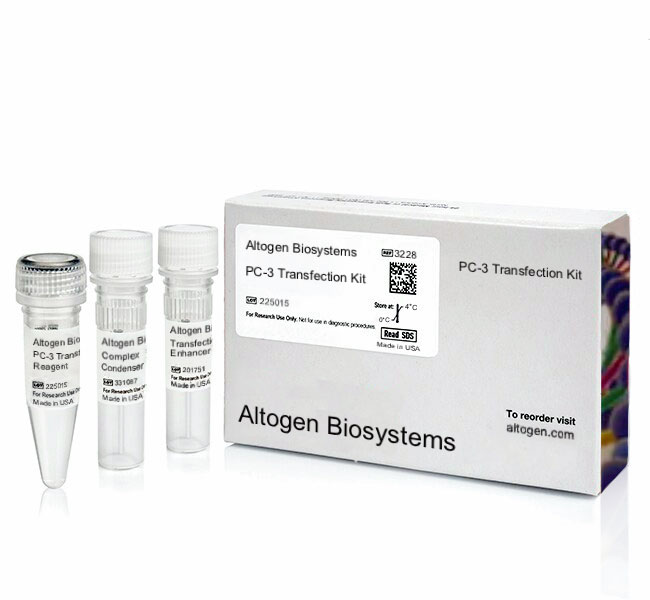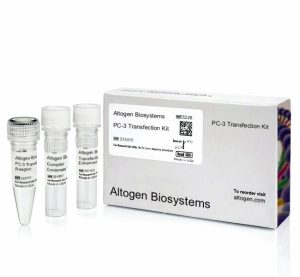Description
Purchase Orders: Click “Add to Cart” button to order, then email PO to orders@altogen.com.
Product Availability: In Stock.
Transfection Reagent for PC-3 Cells (Prostate Cancer Cells)
-
Two component formulation enhances lipid mediated transfection efficiency
-
Optimized easy-to-use transfection protocol provided for transfection of siRNA, plasmid DNA, mRNA, and microRNA
-
Kit includes Transfection Enhancer reagent and recommended transfection protocol
-
High transfection efficacy in the presence of serum
-
Expand your RNAi application with a reagent optimized for delivery of both siRNA and plasmid
- Works well for standard reverse transfection and high-throughput applications
-
Download in vitro PC-3 transfection protocol: [PDF]
- Download PC-3 CRISPR/Cas9 transfection protocol: [PDF]
-
Download PowerPoint presentation for PC3 cells transfection kit: [PPT]
- UPC/GTIN/EAN: 860002089793
-
Brand: ALTOGEN®, developed and manufactured by Altogen Biosystems
Transfection Efficiency:
Reagent exhibits at least 73% transfection efficiency of siRNA delivery. Transfection efficiency was determined by RT-PCR.
Product Description:
High efficiency transfection kit for PC3 cells, a human prostate cancer cell line. Kit includes: transfection reagent, complex condenser and transfection enhancer reagent.
Transfection Protocol and SDS:
Download Altogen Biosystems PC-3 Transfection Protocol: [PDF]
Download SDS: [PDF]
PC-3 Cell Line:
PC3 cells are a type of human prostate cancer cell line that was first isolated from a bone metastasis of a patient with advanced prostate cancer in 1979. PC3 cells are commonly used as a model system for studying prostate cancer and evaluating potential therapies. PC3 cells are known to exhibit a variety of genetic alterations that are commonly found in prostate cancer, including loss of the tumor suppressor genes PTEN and p53, and overexpression of the androgen receptor (AR). They are also highly invasive and able to form tumors in vivo. The American Urological Association (AUA) recommends early detection of prostate cancer through the use of screening tools for all men ages 55 to 69 years, to reduce prostate cancer mortality and increase the survival rate. It is considered the most common cancer in older males and can be cured if diagnosed early. Established human cancer cell lines are valuable models that can be used for anti-metastatic therapeutics development, allowing for greater understanding of the etymology of the disease and new treatment approaches. PC-3 was derived from the bone marrow metastasis isolated post-mortem from a 62-year-old Caucasian man with grade IV prostate cancer after androgen suppression therapy. PC-3 cells have high metastatic potential and can form tumors in nude mice, being unresponsive to androgen treatment. The PC-3 cell line has low testosterone-5-alpha-reductase activity and expresses prostate-specific antigen. This cell line has a modal number of 62 chromosomes. There are nearly 20 marker chromosomes commonly found in each cell; and normal N2, N3, N4, N5, N12, and N15 are not found. No normal Y chromosomes could be detected by Q-band analysis. PC-3 cells express several cytokines and growth factors, including vascular endothelial growth factors, fibroblast growth factors, interleukins and neurotrophic factors. It is suggested PC-3 cells release substances that influence the behavior of the cells in the tumor’s microenvironment. The PC-3 cell line is considered to be one of the classical cell lines for studying human prostate cancer. It has been widely used in molecular and cell biology research as a transfection host and is desired partially for its high ability to metastasize. Altogen Biosystems manufacture PC-3 transfection kit optimized for high efficiency transfection of PC-3 prostate cancer cells.
PC3 cell line mutations:
| HIST1H1C | 3006 | 37 | 6 | 26056117 | 26056117 | Silent | SNP | C | T |
| CEP170 | 9859 | 37 | 1 | 243333048 | 243333048 | Silent | SNP | T | C |
| SV2B | 9899 | 37 | 15 | 91769874 | 91769874 | Silent | SNP | C | T |
| EFHB | 151651 | 37 | 3 | 19924172 | 19924172 | Missense_Mutation | SNP | C | T |
| APBA2 | 321 | 37 | 15 | 29346257 | 29346257 | Missense_Mutation | SNP | C | T |
| NFE2L1 | 4779 | 37 | 17 | 46134783 | 46134783 | Silent | SNP | G | A |
| MYO5B | 4645 | 37 | 18 | 47367798 | 47367798 | Silent | SNP | C | T |
| ZNF436 | 80818 | 37 | 1 | 23688835 | 23688835 | Missense_Mutation | SNP | G | A |
| TMEM54 | 113452 | 37 | 1 | 33361217 | 33361217 | Missense_Mutation | SNP | A | G |
| MACF1 | 23499 | 37 | 1 | 39799747 | 39799747 | Missense_Mutation | SNP | G | T |
| TMCO2 | 127391 | 37 | 1 | 40713747 | 40713747 | Missense_Mutation | SNP | A | T |
Data:

Figure 1. GAPD mRNA levels were quantified using real-time PCR in the PC3 cells transfected with siRNAs targeting GAPD or non-silencing siRNA. Forty-eight hours post-transfection, the cells were harvested and analyzed by real-time PCR for GAPD mRNA expression levels. Data were normalized against the 18S rRNA signal. Control samples were either mock-transfected or untreated. Values are normalized to untreated sample. Data are means ± SD (n=5).

Figure 2. Protein expression of GAPDH in PC-3 cells. DNA plasmid expressing GAPDH or siRNA targeting GAPDH were transfected into PC-3 cells following Altogen Biosystems transfection protocol. At 72 hours post-transfection the cells were analyzed by Western Blot for protein expression levels (normalized by total protein, 10 µg of total protein loaded per each well). Untreated cells used as a negative control.
Selected PC3 transfection reagent citation references:
- Endocrine-Related Cancer 2016. 23(8):595-607. Role of protein S in castration-resistant prostate cancer-like cells. Ning et al [PDF]
- PLOS ONE. 2014. SOX2 Expression Is Regulated by BRAF and … Lundberg et al [PDF]
- Circulation Research. 2010 15;107(8). Kruppel-like factor-4 transcriptionally regulates … Cowan et al [PDF]
Altogen Biosystems manufacturers over 100 pre-optimized in vitro transfection kits for cancer cell lines and primary cells, elecroporation products, and tissue-targeted in vivo delivery reagents for life science research. Advanced formulation of reagents and optimized transfection protocols provide efficient intracellular delivery of protein, DNA, mRNA, shRNA and siRNA molecules. Read more about transfection technology at Altogen’s Transfection Resource. Altogen Labs provides safety and efficacy preclinical research services. GLP-compliant studies for IND applications, and drug development, including over 90 in-house validated xenograft models, safety toxicology, etc (visit AltogenLabs.com).
Volume Options:
- 0.5 ml (Catalog #3227)
- 1.5 ml (Catalog #3228)
- 1.5 ml CRISPR (Catalog #2189)
- 8.0 ml (Catalog #7078)
Purchase Orders: Click “Add to Cart” button to order, then email PO to orders@altogen.com.
Product Availability: In Stock.






